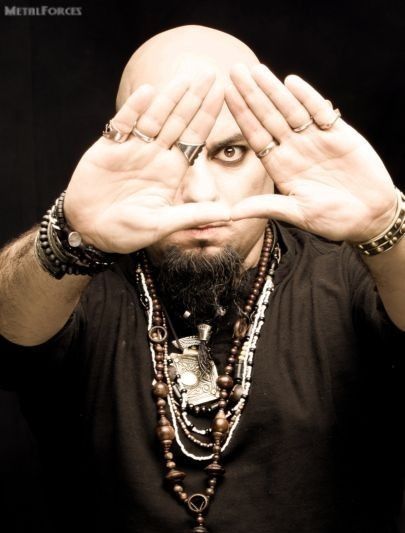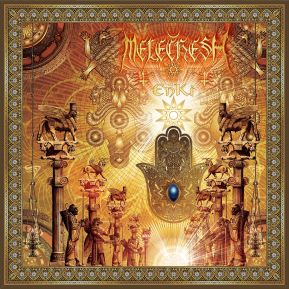
MELECHESH – Multiple Truths
Anthony Morgan
March 2015
 Melechesh (l-r): Scorpios, Ashmedi and Moloch |
![]()
Jerusalem, Israel-born black metal outfit Melechesh took a while to author compositions for February 2015 studio full-length Enki – their sixth overall – founder, vocalist and guitarist Ashmedi writing much of the material alone. Fifth effort The Epigenesis had been issued during October 2010, almost four-and-a-half years prior. In comparison to their peers, Melechesh studio affairs surface less frequently to an extent.
“I write most of the music alone, so it takes a long time between touring and stuff,” Ashmedi explains. “I just basically write guitar parts, add drums to it, make pre-production demos, and then show them to the guys in the band so they can learn it. We spent one month before going to the studio, practising everything after doing demos. Yeah, pretty much that’s the way it goes. Then we take another look at the song, and try to adjust stuff. It’s quite a long process. And yeah, we spent a long time in the studio just recording the damn thing (laughs).”
Platters taking a greater length of time to come to fruition is largely due to one circumstance. “I do all of it on my own, managing the band,” the singer cites. “Writing the songs, you need to be inspired. Every song I want to have a different mood, and not sound the same. All this causes delays and last year, some people came into the band, but they weren’t the right people. That also caused delays, so it’s circumstances that causes this. Also though, the industry has spoiled people because of the fact that some bands are vomiting albums out every year or two. You can tell that the music is acceptable, but not of a high quality. We want to maintain a high quality standard.”
Albeit issuing material less frequently, Ashmedi often pens guitar riffs. “You should hear my riff bank,” he reckons. “I have hundreds and hundreds of riffs. Even just going through them is tedious, so you have to keep on filtering yourself and being your own critic. The best critic in Melechesh is myself; I would spend years going through every note and every riff, and sometimes some fan or some journalist would hear the first five minutes and give me a full review of the album. I would be like ‘What?’ You must be a god of music or something to get it that quickly, because I don’t get it that quickly. I’m still discovering things I did.”
Fellow Melechesh members critique prospective riffs the axeman composes. “I listen to people around me, and sometimes they convince me and sometimes I convince them,” he divulges. “There have been periods where some of our greatest riffs were rejected by the entire band, and then they started liking it later and now they’re ‘hit riffs’ of the band. Something like the introduction of ‘Deluge Of Delusional Dreams’ (from October 2006’s Emissaries), where everybody was like ‘No, no’ in the beginning but then were like ’Fuck yeah.’ Sometimes I would do something, and they were like ‘Hey… Are you sure you want to use that?’”
Asked to critique Enki against past Melechesh offerings, Ashmedi is reluctant. “It’s hard, because I don’t compare,” he reasons. “I look forward, not backwards. It’s just what it is right now. Angry, diverse, credible, skilful. I love this album. Writing the best songs possible; that’s my dream, the pursuit of the perfect song. That’s what we tried to do. Whatever happens, happens.”
Enki’s lyrical content explores “duality, philosophy, Near Eastern occults, a lot of metaphor,” the frontman lists. “There’s a real lot of metaphor, some of it even relating to the events of today – a message from me to other people. Also, a lot of it deals with or hints about the Mesopotamian, Sumerian mythology. This is our domain, and we are always playing around within this domain because this is very vast. There’s always no shortage of material lyrically, because we come from a very rich heritage area with a lot of beliefs, a lot of philosophies, a lot of history, and a lot of mythologies. You get to expand your mind, and I think that’s the lyrics. For me, the lyrics are extremely important. What I like with us is if you’re not into that and you’re just into the music, that’s fine. We’re just like any other metal band, but if you want more, you can go places. You’ve gotta decide, though.”
Ashmedi’s conversation paints the impression that the Melechesh lyricist is a well-read gentleman. “I’ve read a lot of books,” he offers. “There’s not so many not to read (laughs). It becomes repetitive, but it’s not like I’m a walking library – obviously not. I forget a lot, so I do remind myself and re-read them, or I just skim through them and then just start sitting and reflecting, and it starts an idea that becomes a story. So yeah, writing lyrics is a really interesting process. It’s almost the opposite of making the music, because each song needs to be done in a separate timeframe when writing the music. The lyrics, I can get into a zone and just write songs right after each other, because I’m in that kind of storytelling zone. I guess you’ve gotta trigger a place in your mind to do that, which is different. It’s very visual doing it, because while writing, you’re seeing what you’re writing. It’s almost like watching an exclusive film. It’s a privilege for me.”

|
Additionally, current events are somewhat of a lyrical inspiration. “There’s always hints on every album with the lyrics, even the title ‘As Jerusalem Burns… Al’Intisar’ (from the December 1996 debut full-length of the same name),” the axe-slinger muses. “We didn’t mean it like literally burning with fire, because I love Jerusalem. It was more metaphorically with the way of thinking, the whole mass hypnosis they have here. Let’s take ‘Lost Tribes’; I was thinking about the glorious and diverse ancient people in the Near East. In a way, through religion, kind of these legacies were forgotten, from the mighty Sumerian empire to victims now. They’re peaceful, friendly people, and there’s a lot of hate there with what’s happening. Partially it’s due to politics, but partially also due to people following religions, and perhaps either getting indoctrinated or just losing that beautiful legacy they had which resulted in big empires which lasted hundreds of years.
“Another thing is yeah, I take it a little personally. While writing those lyrics, I found out my cousin was shot by ISIS, so I got pissed off. He got shot in the shoulder, because he’s a Christian. Anyway, I don’t want to get into that too much, but it’s disgusting. I hint that what these guys do is fucked up. Afterwards, only now we see what they did to the Mesopotamian ruins and stuff. It’s a tragedy of humanity, and it’s not because they are of an Islamic background or whatever. No, it’s because they are just extremists. They could be Nazis as well, because they all do some kind of shit like that. I do hint about that in ‘Lost Tribes’, and in ‘The Palm The Eye And Lapis Lazuli’. There’s a strong message there that I’m sending, because I’ve had bad experiences with less evolved or less enlightened people.
“You see, enlightenment and empowerment are strengths and not weaknesses. When you see a smart person, when they see that I’m being enlightened and I’m giving them empowerment, they go ‘Oh, wow.’ That’s a very strong and kind person, because it takes a lot of courage to do that. A weak person, like some thug or pirate or punk – and I don’t mean the musical style punk – always see it as a weakness. Usually, you get savage kind of behaviour around you when you’re showing that kindness to people, so that bothers me. I wrote ‘The Palm The Eye And Lapis Lazuli’ about that in a way, and that’s like a second meaning. So yeah, that’s how the lyrics work. ‘Leper Jerusalem’ from Emissaries had three meanings; one religious, one societal, and one about the ancient city.”
Listeners can draw different interpretations from Melechesh’s lyrical meanderings, depending upon individual listeners’ perspectives. “I write them with my intentions, but art is open to re-interpretation,” Ashmedi concurs. “Sometimes when you see that a song says ‘When you left me in the dark’ or something like that, or a love song or whatever, one person will go like ‘Yeah. My girlfriend or my boyfriend dumped me.’ The other person will be thinking about the abuse that they went through. Another person will literally be thinking about, I don’t know, when they were working in a factory and there was a blackout (laughs). It is open to interpretation and I encourage that, because that’s a part of the arts. Listener participation is okay, so you can interpret it in your own way. It’s fine.”
Recording sessions for Enki took place in Athens, Greece. “I wanted somewhere Mediterranean and sunny,” the composer reveals. “Greek culture is very similar to my culture – Assyrian / Armenian. It’s pretty much identical, so I felt quite at home. I didn’t wanna be somewhere where it was gonna be a little gloomy and rainy and muddy. I just wanted somewhere where it was a little bit culturally significant, and with good weather and good food. I mean, I ended up spending almost three months, so imagine that I was somewhere where I wasn’t comfortable. The previous album we did was recorded in Istanbul, so we kind of go against the grain I suppose. One magazine said that Enki was for the book, not by the book, so I found that pretty cool, pretty accurate (laughs). So yeah, it was a good experience. The album got mixed in Sweden though, by the way – not in Greece. It got mixed and mastered in Sweden (at Black Lounge Studio by Jonas Kjellgren), but the recordings themselves were done in Greece.”
How much of an effect where a full-length is laid down can have on the eventual results is open to debate. “I don’t know,” Ashmedi ponders. “It’s more of a luxury, I guess. We did Sphynx (March 2003) in an industrial city near Gothenburg, Sweden, and it still sounds good. We did Emissaries in a little town, a very great, gloomy town in Germany, and it was snowing all over the place, and it still sounds good. It helps you as an artist, though. You feel better. If I feel better, I feel more creative I guess, so maybe I get more spur of the moment ideas. Mind you, the guitars and drums are always planned perfectly in pre-production, but I leave room for improvisation. We just roll the recorder, and I just play whatever leads I want. It’s not pre-planned. It’s whatever I’m feeling at that second, so obviously when you’re in such an environment and you’re feeling it, it comes out good.”
While drums were recorded at Devasoundz Studios and engineered by Fotis Benardo, much of the rest was cut at Grindhouse Studio by George Bokos, Melechesh later convening at their German headquarters. “Our rehearsal room has a studio,” the vocalist discloses. “We’ve done a lot of the traditional instruments there as well, because we have more of them. We didn’t fly them to Greece with us obviously, and yeah, that’s pretty much it. We did some recordings in the States, even. It’s all over the place, and then everything got mixed in Sweden. It’s a global effort I suppose, but that’s what we are. We are a band from planet Earth not bound by man-made borders, so we do things wherever they need to be done, wherever it’s comfortable for us, and that’s how it is. I guess it’s just an extension of my character that I’ve always been a cosmopolitan from all over the place, having lived in so many countries. I’m from Jerusalem, but I’m not even Israeli or Palestinian. My family came from another place, so it just keeps on going like that.

|
“The first language that I spoke wasn’t even my mother tongue; I was speaking French, because when I started speaking, I was in Senegal. Then I lived in the States, in LA, and then I moved back to Israel, then Miami. I lived briefly in Istanbul, I lived in Holland for 17 years, and now I’m in Germany close to our bass player and our stage guitar player. I live in the Rhineland South region which is close to France, but I’m always travelling. At the moment, I’m in Jerusalem. Yeah though, the band is spread out all over the globe. So yeah, I guess people are just…
“Again, it’s a mass hypnosis thing to believe in man-made borders, but I just believe that this is a small planet and you do whatever you do wherever you wanna do it, depending on your needs. And no, it’s not an issue of money, because it might actually be even cheaper. If we spent three months in Norway, it would cost way more, or in Germany. The flights are no longer that expensive. I don’t know. You just take risks. The biggest risk in life is not taking one. Sometimes it pays off, sometimes it backfires. Sometimes it almost backfires, and so you’ve gotta manage it. That’s the process. You’ve gotta do whatever you’ve gotta do.”
Each of Melechesh’s members travelled to Greece for recording sessions. “Everybody flew in there to do their parts obviously, but I’m the producer and I do the majority,” Ashmedi notes. “I did most of the guitars, left and right. Moloch did some guitar leads, not the rhythm. I did the vocals, and I produced the entire thing. I had to be there for the entire period while others could come for brief periods, like coming for a week, recording their parts, and leaving, or staying for a month if they wanted. They’d be welcome – we have a nice place. I tell people in the band that they’re welcome to stay as long as they want, but of course, it’s unnecessary. I was there every day in the studio, though. Physically, it’s painful as well, Sitting down for so many hours and stuff like that, it hurts the back, it hurts the neck. That’s how it is, though.”
As well as spearheading production, the Melechesh guitarist wears many other hats. Whether the future will see him gradually reduce his responsibilities is uncertain. “The band management, pretty much,” he contemplates. “Yeah, well, there’s another catch there. You either get the most professional managers – and we’re not at that level for the most professional managers – or you get the less professional managers, the mid-sized managers, but then I know as much as they do. Even more, because I used to do A&R and work for major labels – at EMI Music and Capitol Records – and I have a master’s degree in business. Sometimes I don’t get their point.
“I did have a personal assistant that helped me with label intensive stuff so I could focus on other things, but she’s not working for us any more. We have a booking agent, though. We have a record company, and they take care of promotion. Our booking agent takes care of the tours. I do look for a manager to take care of the daily stuff, so that I can also have more time to do other things, like more music, maybe write books. But yeah, the band is my full-time job because of the management.”
Having a degree in business administration, not only does Ashmedi have the expertise, but nobody is arguably as passionate about Melechesh as him. “Yeah, but sometimes I’m too passionate,” he concedes. “I need a firewall, because there’s good people and bad people. When there’s bad people you’re dealing with, as a manager you’re tough, but as an artist, you get disenchanted. You don’t wanna play, so you need a firewall, and so then someone takes care of that. Meanwhile, the musicians compose non-stop.”
Drum parts for Enki were initially recorded by a session drummer, but had to be subsequently re-recorded. “That drummer turned out to be a disaster, in every aspect – artistically and attitude wise,” the Melechesh founder regrets. “The person is damaged – he had some mental issues. I discovered every band had fired him, but I had discovered that later. I wish I knew before. That was due to circumstances, but then while looking for the drums to be re-recorded, our first drummer (Lord Curse) said that he would do it. It’s not because he’s our first drummer, though. It’s because he’s a very good friend of mine. We’ve been very close all of these years, very close, but the fact that he has a great career with George Lucas keeps him from wanting to tour and being active in bands.”
At the time of writing, nobody permanently sits in the drumming chair. “It’s a problem,” Ashmedi laments. “We’re looking for someone permanent. A lot of drummers, I find they have something like a pissing contest. The more bands they play in, the better they feel about themselves, but it’s actually detrimental. If you really look at the most successful drummers, they focus on one or two bands. We’re finding great drummers. Even just today, I had to reject a drummer because there’s one show he can’t make. He’s playing with some club band in a bar or something and he can’t cancel that, so I’m like ‘We can’t work together then, because we need a drummer starting with those shows.’ I’ve seen how some drummers have really fucked up their own careers, but that’s how it is.

|
“So yeah, I see that some people just wanna play in so many bands that they end up making a scheduling mess or have a loss of focus. And yeah, it looks good, because some drummers will see themselves in the industry as session drummers that play in many bands, but it doesn’t work like that when you’re very active with touring and stuff. There are some guys that I genuinely care about. Like the other day, I was talking to a guy. I was like ‘I like you so much man, but you’re just ruining your career,’ and he’s starting to see it my way. The person is young, though. He’ll understand maybe in a few years, but then it might be a little bit too late.”
Writing features, a journalist naturally cites the various groups a sticksman has drummed for. With respect to some musicians, the list may possibly amount to 20 to 30 different ensembles. “They feel very proud of that, but it’s actually detrimental to their careers,” the singer argues. “Also, some bands are not so active, so I don’t blame them. If you focus on one or two active bands though and that’s it, then you stick with those bands and not play in so many bands. Literally, there was one drummer that wanted to play with us so much that the night before one of our big shows he was playing a really, really tiny club show, and he couldn’t cancel it. He said he would fly to the show the day of the show, and I said ‘You can’t do that, man.’ It’s a pity. I see him destroying himself, but whatever – it’s not my business. We do our stuff as good as we can, and hopefully we’ll find the right partner.”
Guest contributors include Brazilian vocalist Max Cavalera. Having stepped behind the microphone for Soulfly, Cavalera Conspiracy, Sepultura and Nailbomb throughout the years, Cavalera lends guest vocals to the track ‘Lost Tribes’. “He told us he was a fan of Melechesh,” Ashmedi shares. “They were supporting us because they liked the band very much, and that’s it – that’s how it came about. We were talking about collaborating. He wanted us to do something with them, but then our album came first. He has such a cool vocal style, so I asked him to do it. We said ‘How about you do the vocals for us?’ He did it, despite his really busy schedule.
“Sakis Tolis of Rotting Christ did vocals on ‘Enki – Divine Nature Awoken’ – he came by to the studio. There’s Rob Caggiano, who did a guitar lead. It’s really good, because I wanted a guy who’s agile and could play several styles, and not be a show off guitar player. Rob and I wanted to work together for a while, so we made it happen. He was really busy with Volbeat – he used to be in Anthrax – and right after coming from tour, he was practising on the tour bus, went to his studio, and recorded the lead. It was excellent.”
Schedule permitting, the axeman would be happy to contribute a guest part to a future record featuring Cavalera at the helm. “I’d love to do that,” he enthuses. “Maybe one day I will. Who knows?”
As was the case with previous jaunts Emissaries and The Epigenesis, cover artwork duties fell to John Coulthart. “It’s just a representation of various lyrical items on the album, so it’s something like a collage,” Ashmedi describes. “It’s order and chaos – it’s inclusive of many aspects from Near Eastern culture.”
A music video to promote Enki will hopefully be filmed at a later date. “We should do that, but we don’t have the time to do it at the moment,” the frontman observes. “I guess we’ll do it, but not any time soon. We’re not sure yet which track that will be for.”
Enki was released on February 27th, 2015 in Europe (excluding the United Kingdom), on March 2nd in the United Kingdom, and subsequently on the 10th in North America, all via Nuclear Blast Records.
Interview published in March 2015. All promotional photographs by Edo Landwehr.
Related Posts via Categories
- SCOTTISH SICKNESS – A Report On The Scottish Death Metal Scene, Featuring BRAINBATH, PUTRID FATE And RANCID CADAVER (October 2022) | Features / Interviews @ Metal Forces
- LARVAE – Join The Hardcore Cult! (June 2022) | Features / Interviews @ Metal Forces Magazine
- TRENCH FOOT – Sacrificing Morals For Gory Obscenities (June 2022) | Features / Interviews @ Metal Forces Magazine
- L.A. GUNS – Trigger Happy (March 2019) | Features / Interviews @ Metal Forces Magazine
- CANCER – Crimes So Evil (November 2018) | Features / Interviews @ Metal Forces Magazine
- U.D.O. – The Tank Drives On (August 2018) | Features / Interviews @ Metal Forces Magazine
- SIEGE OF POWER – Bleeding For The Cause (August 2018) | Features / Interviews @ Metal Forces Magazine
- MOONSPELL – A Taste Of Live Eternity (August 2018) | Features / Interviews @ Metal Forces Magazine
- MONSTROSITY – Dark Matter Invocation (August 2018) | Features / Interviews @ Metal Forces Magazine
- SATAN – Five Magicians (August 2018) | Features / Interviews @ Metal Forces Magazine
|
|





